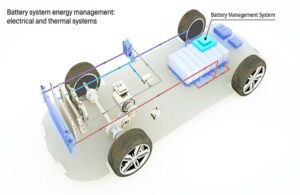Marelli has launched new battery management technologies for electric vehicles using a wireless distributed battery management system that provides more flexibility, efficiency, and reliability, and reduces vehicle costs.
 The technology eliminates 90 percent of wires usually used in other battery management systems (BMS), while at the same time improving reliability and communication between batteries and control units.
The technology eliminates 90 percent of wires usually used in other battery management systems (BMS), while at the same time improving reliability and communication between batteries and control units.
“Wireless BMS is a real game-changer for the automotive industry, eliminating the need for the battery harness, wires, and connectors associated with the standard wired BMS systems,” says Razvan Panati, head of power electronics technology of Marelli’s Vehicle Electrification division.
“Marelli designed both the wBMS and the Wired BMS with identical base architectures, supported by two different ways of communication and interfaces in that way our technology can be applied across multiple vehicle platforms with minimal change,” says Panati. “This flexibility of the solution guarantees a significant reduction in engineering costs and allows Marelli to make this high-end technology affordable for the mass market.”
The wireless system, or wBMS, simplifies the battery cell construction and installation to reduce complexity during assembly and greater flexibility for battery module placement.
Marelli is developing a solution starting in the second quarter of 2022, to support customer launches in 2024.
The reduced weight of the new system allows for more energy efficiency, which expands the driving range of the vehicle with the same charge.
The solution also increases room in the battery pack for more power while promoting adaptability, scalability, and optimization.
The wBMS is a core and smart component in the complex architecture of electric vehicle design. The BMS acts as the “brain” of the battery, managing the capacity of power delivered to the EV, monitors the battery operating conditions, and optimizing energy.
Marelli advanced battery system can possess a software application layer that uses advanced algorithms based on a proprietary technique called “sensor fusion.”
The algorithms estimate several crucial parameters of each battery cell to ensure a more precise calculation of the battery’s status, such as the state of charge, state of health and state of power.
Additionally, Marelli has experience in the development of integrated and distributed BMS operations.
These solutions are a part of Marelli’s portfolio of modular technologies for vehicle energy management that includes subsystems, single components, and solutions for the complete integrated vehicle energy management system.
Accompanied with e-powertrain and thermal design competencies, the wBMS contributes to Marelli’s integrated approach to ensure flexible and customizable solutions and optimize the energy balance in electric vehicles.

